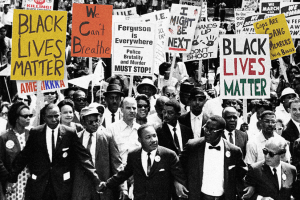by Aleo Pugh
 Education systems and media severely mischaracterize the legacy of Martin Luther King Jr, particularly the national response to his sociopolitical agenda. Nonviolent, an astute leader and oriented towards equality, King is the perfect candidate for robbery of political integrity and the U.S has since devoured him. In post-civil rights era America, King is framed as being consistent with majority opinions about racial injustice during the 60s despite hatred of him by white America and constant surveillance by the FBI. In fact, it was after an elementary and middle school favorite, the infamous “I Have A Dream” speech delivered at the March on Washington, that the FBI pegged King as the “most dangerous and effective Negro leader in the country”.
Education systems and media severely mischaracterize the legacy of Martin Luther King Jr, particularly the national response to his sociopolitical agenda. Nonviolent, an astute leader and oriented towards equality, King is the perfect candidate for robbery of political integrity and the U.S has since devoured him. In post-civil rights era America, King is framed as being consistent with majority opinions about racial injustice during the 60s despite hatred of him by white America and constant surveillance by the FBI. In fact, it was after an elementary and middle school favorite, the infamous “I Have A Dream” speech delivered at the March on Washington, that the FBI pegged King as the “most dangerous and effective Negro leader in the country”.
While part of King’s distortion can be met with claims of protecting the innocence of young children (read: protecting white morality and fragility), manipulation of his legacy is critical to the fabricated agreeability surrounding King and the Civil Rights Movement in general. It is the corruption of King’s message that is selectively used today to silence and subdue contemporary Black liberation movements.
King’s imagined sainthood is constructed from early on, usually in his differences with Malcolm X and the Black Panthers. This dichotomy of good vs. evil, nonviolent vs. violent, is the basis for the type of respectability politics that is weaponized as a tool of pacification against the Black Lives Matter (BLM) movement. Respectability politics, coined by Evelyn Brooks Higginbotham in her influential text “Righteous Discontent”, is the practice/politic of adopting the manners and morality of the dominant (in a U.S context) white culture as a way to counter negative views about Black people and Blackness. Respectability politics are largely rooted in middle class ethics, encouraging adherence to white standards as a solution to mistreatment, discrimination and racism. While respectability politics are socially enforced, they are also circulated within Black communities. The belief in good behavior and proper jobs as protection from racism is often an easier pill to swallow than the reality of indiscriminate white supremacy. In the context of social movements, respectability politics typically functions to ensure that group members assimilate into mainstream society and remain uncombative in order to protect the credibility of an organization and their objectives.
Following any sort of action, whether dispensed by BLM or not, tweets condemning the movement with decontextualized MLK references can be found flooding timelines.


Despite all of the BLM movement’s affiliated actions remaining nonviolent, BLM is still criticized, unqualified for the title of “goodness”. BLM is typically condemned for interrupting people’s lives (aka: the point of protest), being too angry and divisive and “making everything about race”. If any of BLM’s critics who simultaneously appropriate King’s quotes learned about him beyond a first-grade picture book, it would be clear that the Civil Rights Movement had comparable practices to BLM and was met with similar discontent. The issue has never been the means by which Blacks strive for justice and liberation, but that we dare to aspire towards it all.
BGD is reader-funded and we need YOUR support.
GIVE BACK and help amplify QTPoC voices.
These tweets perpetuate the good vs. evil, nonviolent vs. violent rhetoric that is conditioned in early childhood and left uninterrogated. Aside from these respectability politics growing out of false ideas of the Civil Rights Movement, they essentially police Black people with the proverbial “turn the other cheek”. The belief in an appropriate level of decorum for citizens when interacting with authoritative figures is arbitrarily assigned to Black folks. It requires us, regardless of the insufferability of our conditions, to remain calm and peaceful in order to maintain a humanity that we were deluded into believing we ever had. Respectability politics limits the potential of contemporary movements by demanding our tactics remain the same, rooted in love and nonviolence, while the systems we are battling become increasingly insidious.
If King’s work were explored with the intent of actually learning about his political developments and values instead of cherrypicking information to propagate a holiday-worthy narrative, the similarities between the two movements would be visible. Similar or not, comparisons between the two movements determined to point out some sort of ideological inconsistencies are meaningless. Comparisons between the Civil Rights Movement and BLM operate under the assumption that the Civil Rights Movement is exemplary, the movement to end all movements. However, BLM differs because it’s supposed to.
Within the BLM movement, there are many local leaders and organizations such as Black Youth Project 100, Hands Up Untied, and the Black Lives Matter national network. While the various organizations comprising the BLM movement are connected under a collective belief in the value of Black lives, they differ in demands, strategy and leadership. In the case of the Black Lives Matter organization, it was founded by three queer black women: Alicia Garza, Patrisse Cullors and Opal Tometi. Within the organization, there is a clear rejection of respectability politics, particularly the false relationships forged between speech, ways of dress and police harassment. There is also a rejection of conservative “keep the peace” theologies that are eagerly projected onto the BLM movement. Respectability politics are also renounced in the organization’s guiding principles, just some of them being: centralizing Black women; and affirming queer and trans folk. This is an outright refusal to adhere to the queerphobic, patriarchal and classist ethos of the Civil Rights Movement, both in leadership and values.
This MLK day, let’s all celebrate by making a collective effort to leave the false comparisons of the Civil Rights Movement and Black Lives Matter in the past. If what is truly desired is to deny Black folks the right to self-determination, leave Martin Luther King Jr. out of it. America killed King once, and the American myth-making machine’s misappropriation of his legacy is due to kill him again.
 Aleo is a Black, queer, non-binary undergraduate student studying Journalism in LA. When not writing, they can be found writing music or advocating for the destruction of the gender binary. You can read more of their work by visiting http://urge.org/autho
Aleo is a Black, queer, non-binary undergraduate student studying Journalism in LA. When not writing, they can be found writing music or advocating for the destruction of the gender binary. You can read more of their work by visiting http://urge.org/autho
Do not republish anything from this site without expressed written permission from BGD. For more info, go here.
BUY BGD BOOKS














